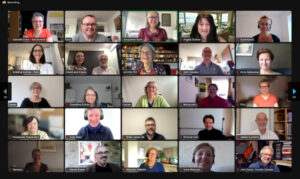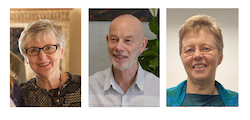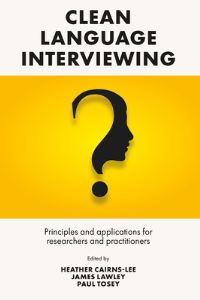We established The Developing Group in 2001 as a regular forum for the exploration of new ideas in the field of all things Clean – and we met three to six times a year until 2022. Totalling exactly 100 workshops!
The list of topics below represents the development of our ideas and methods since the publication of our book Metaphors in Mind in 2000.
Our aim was to provide a setting where, within a clean approach:
- Leading-edge thinking can be applied in practical ways
- We can go into greater depth and get feedback on specific aspects related to Symbolic Modelling and other Clean approaches
- Participants can develop their modelling skills and the ability to work systemically.
Online (at devgroup.thinkific.com)
The Developing Group was for people who used Symbolic Modelling and David Grove’s Clean Language, Clean Space, Emergent Knowledge and other Clean processes. Annual membership of the group was open to those who were recommended by a leading member of the Clean community, or who have the equivalent of 10 days training and who have maintained a fluency with Clean Language.
The Developing Group was not a training. Each day examined a topic that we found interesting and worth researching. Participants did not know what the topic would be until we sent out an email a few weeks in advance.
Often we provided preparatory notes which, with the input from the day, either formed the basis for an article or were published as a ‘work in progress’ paper.
All the topics presented at the group are listed below. Most of them contain a link to preparatory notes which, with the input from the day, either formed the basis for an article or were published as a ‘work in progress’ paper. Click on the links below to go direct to the relevant paper. Or if you prefer a you can browse a brief description of each paper at The Developing Group papers.
In 2020, our twentieth year, circumstances meant we needed to go online. As a result the group developed a more international membership. Each workshop was run over two recorded half days. The recordings and resources created for the online workshops are available here: devgroup.thinkific.com.
If you would like to access this material please contact us to discuss it.
Penny Tompkins and James Lawley
* These papers are published in various professional and academic journals.
| YEAR | DATE | TOPIC |
| 2022 | Nov 26/27 | The characteristics of heuristics |
| Oct 1/2 | How desires and problems relate | |
| Jun 11/12 | Working with Intensely Un-resourceful States | |
| Apr 2/3 | On the Edge: Facilitating at the margins | |
| 2021 | Nov 20/21 | Going Out and Going In: Dissociation and Fragmentation |
| Sep 11/12 | Living in the Blend – Counterfactual thinking | |
| Apr 24/25 | From whence it came: Revisiting David Grove’s early work | |
| 2020 | Nov 14/15 | Seizing a Thought: Learning from Method of Levels |
| Sep 5/6 | Stick or Twist: Tracking attention | |
| July 4/5 | Investigating Agency | |
| May 2/3 | David Grove’s last four questions |








